You’ve probably heard about blockchain technology before, either in the context of IT innovations of the last decade or due to its linking with cryptocurrency and “the infamous Crocodile of Wall Street.” Today, we want to talk about blockchain in ecommerce and this time—beyond the use of crypto payments.
One of the most significant implications of blockchain on online commerce is how it can tackle technological, legal, organizational, quality, and consumer issues by influencing the performance of already adopted technologies. Here we talk about data transmission, exchange, and traceability; compliance and customer verification; creation of decentralized autonomous organizations, and more. So, how does blockchain ecommerce influence the market, and why do you need to consider adopting it? Below are the answers.
What Is Blockchain?
Blockchain is a type of technology that has derived its name from the structure of this digital ledger: individual records of activities, called blocks, are linked together in a list, called a chain. The chain of blocks creates a database called nods, peers, or miners, whose task is to validate and transmit the transaction data, thus eliminating the need for regulators or intermediaries. This concept is the easiest to explain with money transfer transactions. This is how blockchain works with crypto payments.
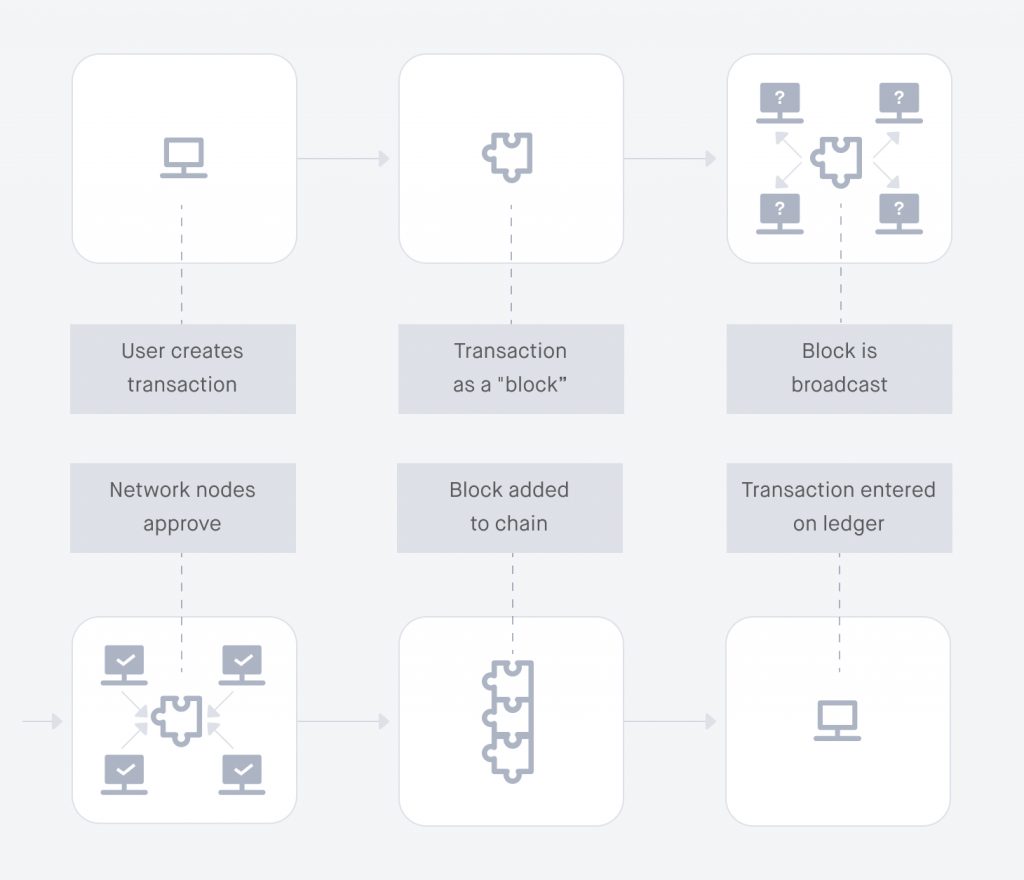
These types of transactions allow to track payments, prevent using the already used money, keep the input data intact and make it impossible to alter as it’s sent to and monitored by all the nods simultaneously.
The blockchain types can be permissionless, permissioned, or hybrid.
- Permissionless ones create public networks allowing anyone to join the network pseudo-anonymously and become “a nod” without restricting the rights of other nodes.
- Permissioned blockchains allow for private (one authority) and consortium (group) types of control as to who can become the nod and what rights they have within the structure. In permissioned blockchains, all identities are known to other blockchain users.
- A hybrid type includes the properties of both. Let’s look at how the types of blockchain and ecommerce work together.
How Do Blockchains Work in eCommerce?
The public, private, consortium, and hybrid types are used in ecommerce blockchain projects for various reasons:
- Public ones, for example, are connected with cryptocurrency and mining, where decentralization and independence lie at the core of safe and transparent transactions.
- Private (or managed) blockchains are controlled by a single organization that regulates the access and permissions for other users, so they are used for the creation of B2B exchange networks.
- Consortium blockchains are governed by groups of organizations and are widely used to digitalize supply chain paperwork to allow a safer collaboration on the documents.
Hybrid blockchains are controlled by an entity, yet it’s paired with the public blockchain to assure the transparency of some transaction validations.
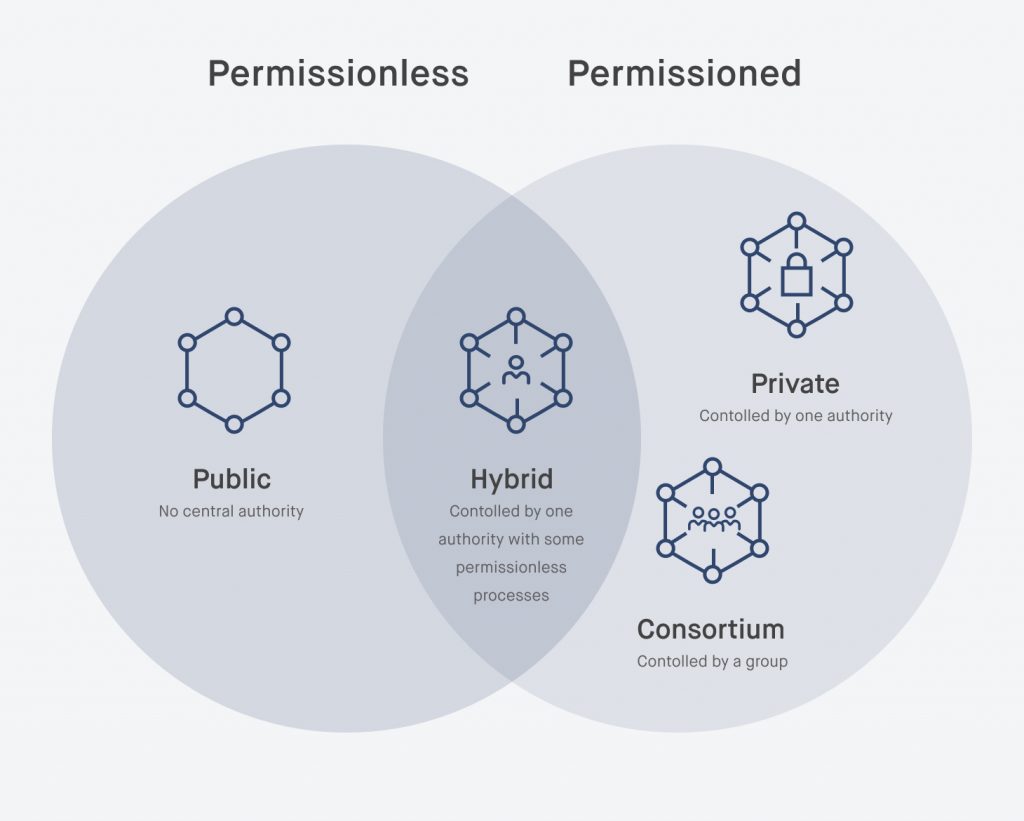
Blockchain ecommerce can combine these types for different operational processes. For example, the companies may deploy private, consortium, or hybrid blockchains to manage their supply chain processes and B2B agendas and use public blockchains to add more payment options and process cryptocurrency payments.
Let’s see the benefits that online merchants can have from blockchain technologies.
Benefits of Blockchain in eCommerce
The fact that more and more global businesses like Expedia, IBM, Amazon, Samsung, PayPal, and Walmart among others, use blockchain ecommerce technologies proves that they are worth investing in. Moreover, with the market forecasts that the global blockchain supply industry will grow from $253 million in 2020 to $3,272 million by 2026, you can tell that it isn’t just another hype.
We’ll describe the four biggest perks of adopting it regardless of the business size.
Cost and Time Efficiency
Using blockchain can save you time and money on finalizing transactions and on third-party systems integration for payment processing and inventory management. Let’s review each case.
Since blockchain payments do not involve intermediaries such as banks, who also deal with verifications and fraud detection, they enable people to conduct fast and direct transactions. In this case, the transactions only need to be confirmed by the system and finalized in seconds, which is beneficial for your revenue and your client’s peace of mind.
As for inventory management, blockchain technologies (particularly hybrid and consortium) can be used to leverage the stock, inventory, and logistics cost and prevent price fluctuation due to misinformation or intentional attempts to change the price or supply terms.
Privacy and Security
Blockchain technologies allow the users to provide transparent and controlled payments and transactions, which is a huge perk when you want to minimize the chances of your business becoming a victim of fraudulent activities. Because every transaction is monitored and verified by the trusted entities only, blockchain for ecommerce becomes an additional layer of fraud and cyber-attack protection.
Data Traceability
E-commerce transactions that occur during supply chain management bear a lot of interdependent data, which is why it needs to remain as it is. For example, your store has 15 beauty kits for $90 each, and someone alters the amount to 1500. You have around 1000 clients who ordered and paid for the kits. When you realize the shortage, you contact your supplier to order more. If the supplier agrees to sell you more, nobody can guarantee that this will be the same price that would allow you to sell it for $90 each. If they refuse, you’ll have to deal with apologizing and fund returns, which, in e-commerce, can take up days and cost you disappointed (ex)customers.
Blockchain ecommerce technologies prevent such situations, as they store purchase-related data in an ordered and immutable manner. This grants its intactness all through the supply chain.
Decentralized Cloud Storage
Blockchain operates with cloud storage to send the data throughout the network. It allows breaking the information into pieces and transmitting it throughout the chosen network. Emerging companies like Sia and Storj are now offering end-to-end cloud storage solutions that are based on blockchain technology. How does it benefit e-commerce businesses? It creates protection against cyberattacks and allows for fast and complete data recovery, which can be extremely handy for businesses that deal with sensitive information.
Here’s the list of cases where blockchain ecommerce adoption will make sense for your business.
Top 5 Ways to Use Blockchain for Ecommerce to Your Advantage
From deal-making to rewarding your clients with loyalty points, blockchain ecommerce can be used for both client-side and partner-side operations.
Read also: NFT in eCommerce
Smart Contracts
Smart contracts are also blockchain-based. A valid digital signature shows that the content is original as sent, and the sender is known. In the blockchain, the signatures are mathematical techniques that verify, which has to do with public and private keys. With the private key, it’s possible to sign any document that the user wants to, but it’s the public key that authenticates and ensures the integrity of transactions. And this public key is visible and trackable.
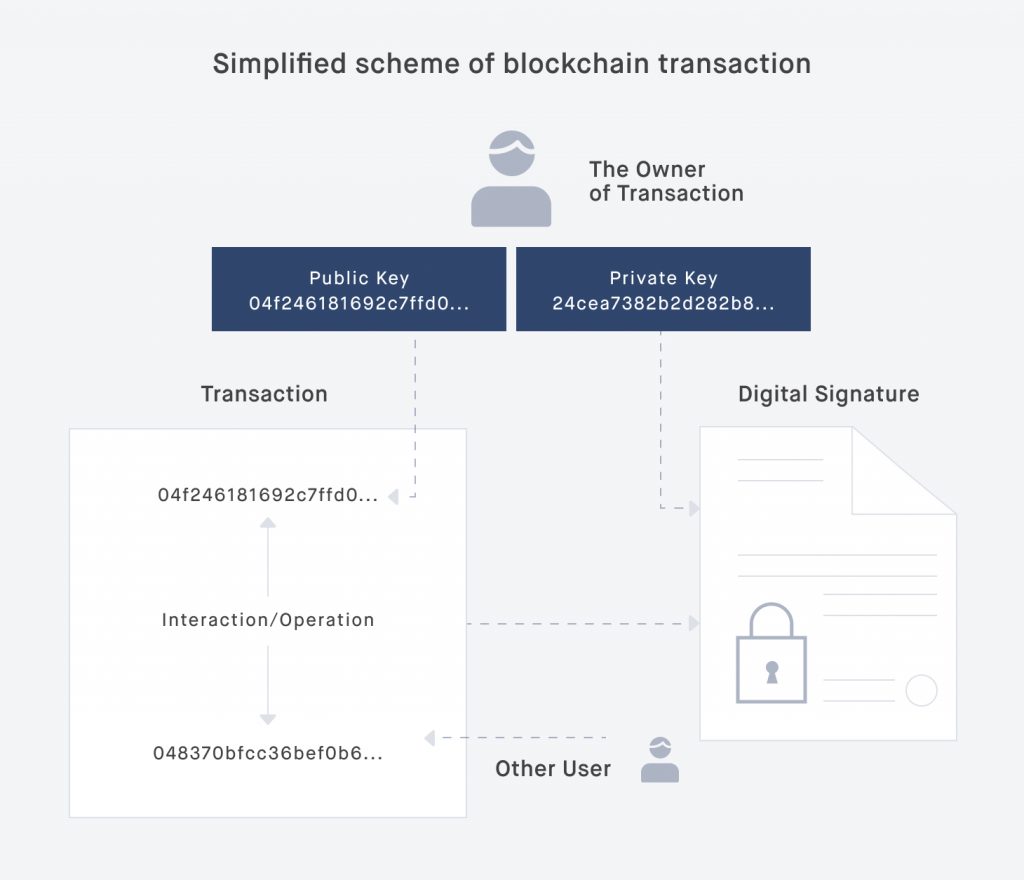
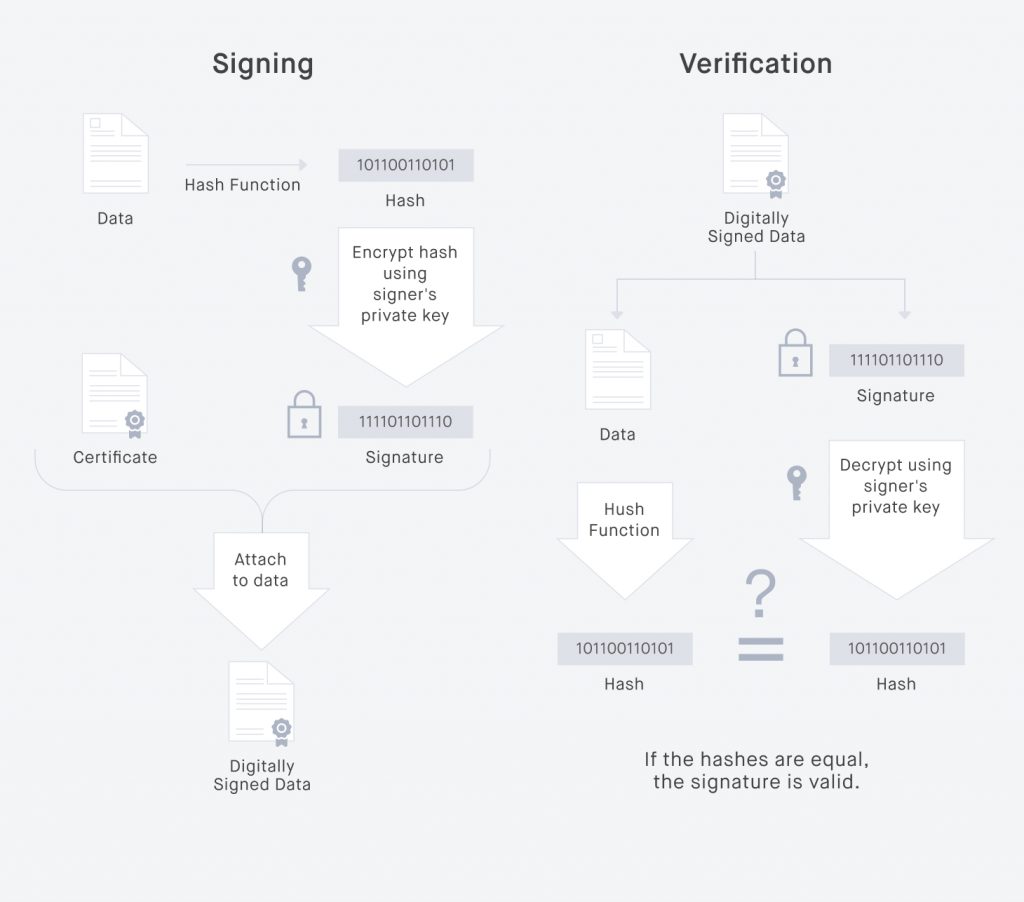
In e-commerce, contract verification and authentication drive the whole industry and eliminate the need for in-person meetings, which is extremely helpful in the time of the pandemic. With smart contracts, you can avoid bureaucracy without compromising performance. This way, blockchain ecommerce technology helps businesses to exchange money, property, shares, or anything that involves certain value if the predetermined terms and conditions are met. The Home Depot, for example, uses IBM’s smart contracts, and many American and European banks also benefit from an opportunity to expand the client and partner network faster.
Supply Chain
The data in a blockchain network is immutable, allowing companies to monitor their suppliers’ quality compliance. This feature can help to enhance the brand’s credibility, especially for the industries where quality is a part of the produced value.
Take a supply chain in an online food store. If you sell organic-only goods, you want to make sure that every product is organically sourced or produced, especially if you have overseas suppliers and don’t have much opportunity to control that in person. The blockchain allows the retailers to track their product origin and later use that data to boost their brand credibility, efficiency, and safety to appeal to consumers.
Loyalty Programs
Reward programs become a part of customers’ expectations when they choose the brand to buy from, and 78% agree to switch to a company offering a better and more straightforward program. However, it doesn’t mean that they will necessarily want to spend the rewards on themselves—61% of respondents would rather donate them to a good cause if they can. Here we have a few issues that can be tackled using blockchain ecommerce technologies: transfer of the reward points and smart and straightforward contracts that would assure easy point collection and redemption. But that’s not only it.
Blockchain tokens can be used to create a network of partnerships and land more consumers by offering unique promotions, loyalty programs, and reward points that can be later converted into discounts or payment options.
Singapore Airlines, Chanticleer Holdings, and even banks are already using blockchain ecommerce to make the reward game faster and more enjoyable for their clients.
In its report “Making Blockchain Real for Customer Loyalty Reward Points,” Deloitte shares a roadmap to blockchain implementation. Here’s what they suggest.
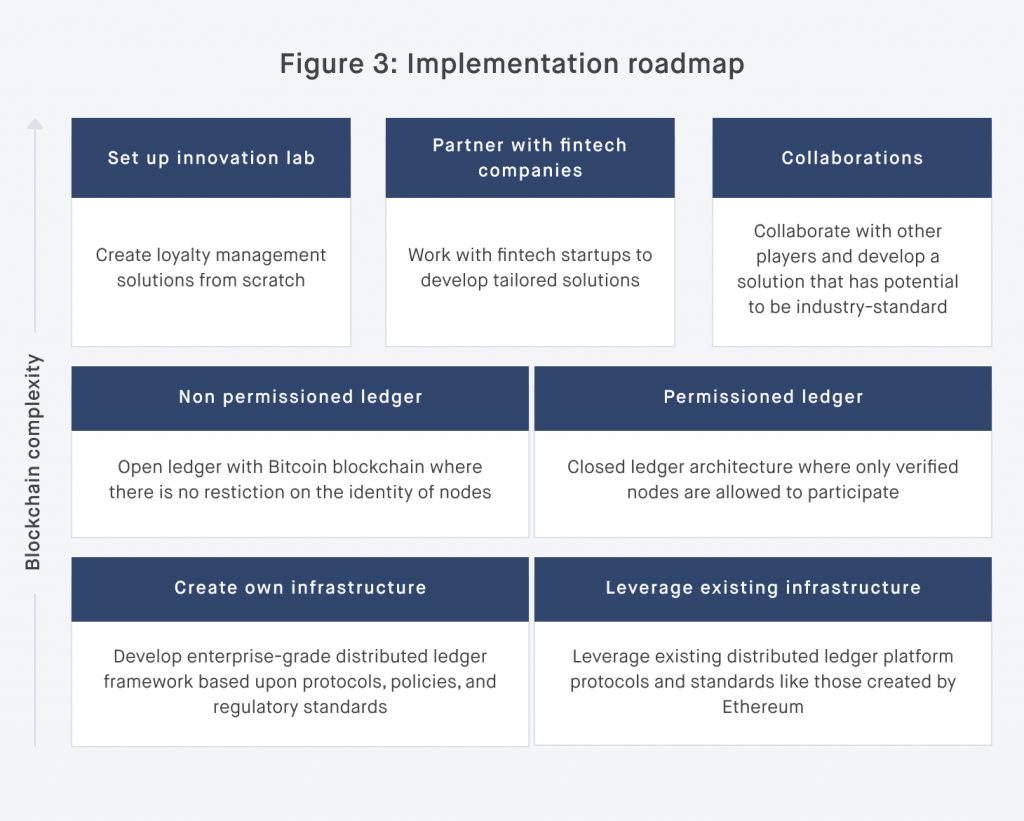
Cryptocurrency Payments
According to Coinmap, around 28,691 venues worldwide accept cryptocurrency as a payment method—and this number is only going to grow. The reason? Blockchain technologies make sending and collecting payments more convenient when shopping online than the typical card processing that involves banks. In addition, they do it more securely. And for e-commerce, speed and security are important.
As we mentioned earlier, blockchain in ecommerce not only eliminates the need for external verification as it performs this function by definition and makes the payments processed in seconds.
Genuine Verifiable Reviews
The reputation and market success of the company relies heavily on client feedback and as we know, what we see in the “Rating” or “Review” sections isn’t always true. With blockchain, the companies can verify online reviews, thus giving the customer power over their decision-making and purchasing process. How so? By preventing the users who didn’t purchase (and thus—outside the system) write reviews as if they did. Blockchain can be used to authenticate the user and publish the reviews of the verified customers.
Read more: Best Practices for Ecommerce Fraud Prevention
Blockchain and eCommerce Afterthoughts
Blockchain isn’t about payments only, and the e-commerce segment can greatly benefit from this technology. It improves the fraud and cyberattack resistance of the commercial data and online tools, changes how business can treat its clients with loyalty rewards, improves overall performance and decreases costs of supply chain management, making it more affordable and automatic. But you need a skilled engineering team to integrate the blockchain technologies into your system to reap the benefits.
Elogic, an ecommerce website development company, is here to marry blockchain and ecommerce, so your business is ready to respond to the challenges of modern online commerce and embrace the benefits that come with it. Contact us, and let’s talk about the improvement of your operational processes!


